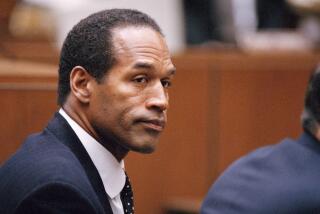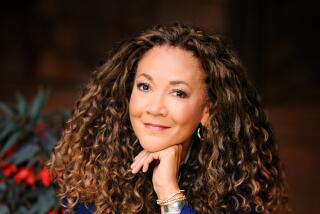Los Angeles Times Interview : Harlon L. Dalton : Talking About Race to Bring the Nation Together
- Share via
Propelled by the shock waves of the startlingly sudden “not guilty” verdicts in the agonizingly long O.J. Simpson double-murder trial, troubling questions about racial divisions in this city have once again come rattling at our doorsteps. Many residents of mostly black neighborhoods in Los Angeles cheered and gave thanks when hearing the verdict; in mostly white Brentwood, there were expressions of shock, anger and dismay. The polarization of opinion about the Simpson case--divided sharply along racial lines--is the latest reminder that, despite decades of effort to end race-based discrimination, there is still a chasm of misunderstanding between blacks and whites in this city--and in this nation.
It’s difficult to think of any way the Simpson trial advances understanding between the races. Trial watchers hear the “N word” spoken repeatedly during the Simpson trial. One of the defense team’s own lawyers, Robert L. Shapiro, accuses his colleagues of playing the race card “from the bottom of the deck.” Listeners to talk radio hear the subject of race debated by shrill, disembodied callers who are put on the air specifically because of their extremist views. Thoughtful and intelligent discourse about racial differences seems as rare as a smog-less September afternoon.
At the heart of this dearth of meaningful dialogue between the races, says Harlon L. Dalton, is the difference in the way blacks and whites think about the very nature of belonging to a race. Dalton, 47, a professor at Yale Law School, notes that while blacks identify strongly with their race as a group, whites tend to overlook their race, and focus instead on ethnic identity. That, he says, creates a menagerie of missteps and miscommunications that perpetuate racial tension and division.
Dalton tries to bridge the racial divide in his new book, “Racial Healing: Confronting the Fear Between Blacks and Whites.” He uses anecdotes and his own personal experience to suggest ways that whites and blacks can discuss their differences with candor and honesty. And he proposes as a goal not a colorless society, but one that, having removed the racial pecking order, celebrates a broad pallet of color.
While some may find Pollyanna lurking in Dalton’s text, his is a thoughtful exploration of the bedeviling business of understanding, told with humor and humanity. In an interview from his New Haven, Conn., home, he talked about the terminology of race, the positive effects of the Simpson trial and the potential of a political message that seeks to unite, rather than divide, the peoples of our nation.
*
Question: One of the major themes of your book is that white Americans, in general, don’t think about being a member of a racial group, the way blacks and other people of color do. How is this a key cause of the racial divide?
Answer: It can be very galling to black people to encounter white people who don’t think of themselves as having a race, because for us, it’s such a daily reality. So blacks react negatively when whites say things like, “I don’t think of myself as white.” And when whites encounter blacks who are quite aware of being black, it is all too easy to think blacks are hypersensitive about race. So the difference in perception often results in a lot of miscommunication.
There is also a connection between that sense of racelessness, which many whites have, and a sense that one is entitled to what one has in this life. Most whites will freely acknowledge that blacks have suffered as a result of slavery, segregation, poverty and the rest. But most don’t recognize that whites have benefited from that phenomenon. So to the extent that most whites don’t think of themselves as members of a race, it’s easy for them to disassociate themselves from the privileges that go with having white skin.
Q: Part of the lack of dialogue seems to stem from the continuing confusion about what racial terminology to use. Are white people Caucasians? Are they Anglos? Should I refer to you as black, or African American?
A: If we trust each other, none of this matters. The problem is, most of us don’t trust each other across the racial divide, and, therefore, if a white person says, “I don’t think of myself as white, or Caucasian, or Anglo, I think of myself as Irish American,” or whatever, what we as blacks hear is someone running away from race. Similarly, if a black person insists on being called African American, what whites hear is, “Uh-oh, these people change names every few years, and now they’re going to think I’m a racist because I don’t have the right terminology.” And so the confusion about terms is just one more example of why it’s important to put aside all our fears about what people are going to think about what we are going to say, and just say it.
And I think that most black people don’t understand how important ethnic identity is to most white Americans, and we don’t understand how alienated many white people are with the label “white”--not because they are running away from responsibility, but because it simply has no meaning in their daily lives. And whites don’t understand why black folks fret so much about these terms and labels. For black people, trying to find a label for our ethnicity is part of hanging on to our culture. And we want to divest race of its meaning in the hierarchy of our society, while at the same time hanging on to our culture. So that’s why we may prefer “African American.”
Q: Obviously, the racial hot potato of the moment is the Simpson trial. Do you see the controversy over the verdicts as fuel for a healthy discussion of how to bridge the racial divide?
A: Soon enough, we will tire of all the Simpson pundits and Monday-morning quarterbacks, and we’ll have a choice--will we put race back in the closet, or try and deal with some of the issues that the reactions to the verdict have underlined so dramatically? The first step is to recognize that the difference in the reactions we see between most whites and most blacks was not caused by the Simpson trial, or by the verdicts. They reflect pre-existing differences. The trial simply brought them to the surface. So as time passes, and we are no longer focused on O.J. Simpson or Johnny Cochran, the overall social differences will still be there. If we don’t address them, we will continue to have the periodic rude awakenings which show us we are deeply divided.
The second step is to understand that the Simpson trial revealed very different fears within the races. For most black people, when Simpson was arrested, there was a sense of great danger for us as a people. We didn’t quite know what form it would take, but we were worried that the message would go forth, once again, that black men are animalistic and violent. Another of our fears: No matter how successful we are, we can be brought down. I think these fears shaped the way black people viewed the evidence, and their reactions to the verdicts. And I should say that while there were places where people cheered the verdict, I think a much more common reaction among black folk was one of relief.
I think white Americans had their own fears about the case. They were worried that, were he convicted, there would be more riots. And they may now believe that a predominately black jury cared more about race than about justice, and that Simpson is a violent black man who got away with murder.
So it seems to me that we’ve got to put all that out on the table. White folks who might say to their white friends that the jury verdict was based on race need to say that to blacks. And blacks need to express to whites their feelings that maybe they were a little too eager to take down this successful black man.
I’m not saying that the trial needs to be replayed endlessly--in fact, I think that would be a mistake. But I am saying that we need to acknowledge the different range of fears that have affected the way that we reacted to the verdict. But the worst thing that could happen is for people to take all those fears and emotions and just tuck them inside and let them fester, and talk only to people who agree with them.
Q: How do we get to a place where we can be more frank and candid when talking about these matters of race?
A: Part of the difficulty is that most of us live very segregated lives. Many of us don’t come into contact with people of a different race, except in situations which are formal--like employer-employee, where having a frank conversation is too risky. So part of the answer is to put ourselves in positions where we spend enough time with people of other races, so we know we can take those risks and come back a day later and patch things up if there’s a problem. Apart from that, we have to understand that there is an upside to talking about race. We all know that we can be made to feel real bad, whatever color we are, when talking about race. What’s harder is to recognize the advantages of that type of discussion. And those advantages are many. We’ll take steps toward ameliorating the conditions in our inner cities. We will do our economy a world of good, and lessen the despair and sense of hopelessness that many black folk feel. There needs to be an understanding that everybody wins from improved race relations.
Q: You believe that blacks must take responsibility for improving the lot of their race, but that they must have the help of whites in dismantling the racial hierarchy. Why is it in the self-interest of whites to abolish a system where they are the dominate race?
A: Some individuals may lose a little something in the short run. It’s something like the man who gives up being king of the castle. Perhaps he loses in the short run, but what he gains in the long run are relationships that feel more whole and genuine. He gets to share the responsibility for his family, rather than being solely responsible. He can have a wife whom he can talk with, instead of to. In the same way, we can create a racial partnership in this country that holds the promise of lots of dividends. For instance, I believe most white people spend a lot of psychic energy trying to assure themselves that they are really good people when it comes to race. Most whites have no desire to think of themselves as racists or bigots. If, in fact, racial hierarchy were eliminated, it could be incredibly liberating for many white people.
Just the reaction by whites to the possibility that Colin Powell might run for President, and the warmth with which he has been embraced by whites, are reflective of a desire for an easier time when it comes to race relations. And if we all tried to imagine what our ideal country would be, I think blacks and whites would come up with pretty much the same things--that we could all live here, and bump into one another without any problems.
Q: You mentioned Colin Powell. Do you think it will take a powerful political figure to bring about the kind of racial healing you envision in your book?
A: I think that a candidate who made that part of a platform would be well on his or her way. Bill Clinton would be in much better shape than he is today if he had embraced the theme of racial healing early and often in his presidency--those notes he sounded in his campaign about America not being able to waste a single individual. Part of Colin Powell’s appeal is the hope of racial redemption. I think that’s really important to Americans of all stripes, and it’s mystifying to me that many politicians view it as politically proper to go in the other direction, trying to divide people. Very few seem to recognize the benefits, to themselves politically, as well as to the soul of the nation, in bringing people together. And bringing people together does not mean we ignore our differences. It means understanding our differences, trying to resolve those which are unhealthy, and celebrate those which are helpful.
Q: Does it make you feel any better that Gov. Pete Wilson’s presidential bid, which was based, in part, on opposition to affirmative action, failed so quickly?
A: Yes, I think we should take note of the fact that the candidate who centers his campaign on dividing “good white people” from the rest of us found his message falling on deaf ears--even in states like New Hampshire, which are fairly conservative. I just don’t think that’s the message Americans want to embrace. We want to feel good about ourselves. And we want to be better. And I think even those who talk as if we are colorblind as a society, talk as if, indeed, racism is a thing of the past know in their bones that we are deeply divided, that we are suffering from a great racial wound and want nothing better than to heal it.*
More to Read
Sign up for our Book Club newsletter
Get the latest news, events and more from the Los Angeles Times Book Club, and help us get L.A. reading and talking.
You may occasionally receive promotional content from the Los Angeles Times.










